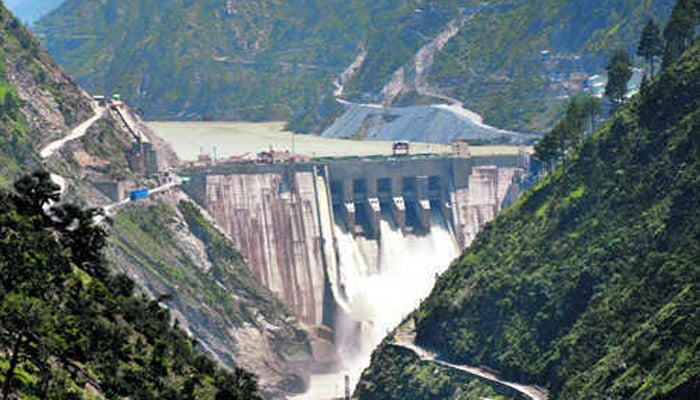WB gears up for ‘fresh initiative’ to resolve Pakistan-India water disputes
The World Bank has assured Pakistan of its ‘fresh initiative’ to resolve the country’s water disputes with India, which has already completed 330-megawatt Kishanganga hydropower project on the western waters in Kashmir.
ISLAMABAD: The World Bank has assured Pakistan of its ‘fresh initiative’ to resolve the country’s water disputes with India, which has already completed 330-megawatt Kishanganga hydropower project on the western waters in Kashmir.
“With the ongoing challenge of climate change, water issues are likely to be more prominent on the international agenda,” President World Bank Jim Yong Kim said at a meeting with Foreign Minister Shah Mahmood Qureshi on Monday on the sidelines of the 73rd United Nations General Assembly session in New York.
The focus of the meeting was the World Bank’s role in implementation of the Indus Waters Treaty as its administrator.
Kim said while he understood Pakistan’s position on the Indus Waters Treaty he expressed the bank’s desire to play a constructive role in resolving this important matter at the earliest.
“The World Bank is in the process of finalising a fresh initiative and will soon be approaching Pakistan and India with details,” an official statement quoted him as saying.
Pakistan and India disagree over whether or not technical design features of the two hydroelectric plants Kishanganga and Ratle (850 megawatts), being built on tributaries of the Jhelum and Chenab rivers, contravene the Indus Waters Treaty.
India has already completed construction of Kishanganga hydropower project. The treaty designates two rivers as well as the Indus as the western rivers to which Pakistan has unrestricted use.
Under the treaty, India is permitted to construct hydroelectric power facilities on these rivers subject to constraints specified in the treaty.
Pakistan first moved case to the World Bank, which is a custodian of the treaty signed in 1960, about formation of court of arbitration for resolving the issue. India, on the other hand, opted to go for appointment of neutral experts to buy time and to delay the whole process.
Foreign Minister Qureshi said Indian construction of these projects represented a violation of the treaty, “which gave Pakistan exclusive rights to western rivers”.
“The procedural delay on Pakistan’s request to the World Bank to empanel the Court of Arbitration resulted in completion of the Kishanganga project while construction work on Ratle is in progress,” the minister said.
The meeting was conducted in a cordial setting. Both sides resolved to maintain regular contacts at various levels to seek an early and amicable settlement to the issue.
-
 Apple Sued Over 'child Sexual Abuse' Material Stored Or Shared On ICloud
Apple Sued Over 'child Sexual Abuse' Material Stored Or Shared On ICloud -
 Nancy Guthrie Kidnapped With 'blessings' Of Drug Cartels
Nancy Guthrie Kidnapped With 'blessings' Of Drug Cartels -
 Hailey Bieber Reveals Justin Bieber's Hit Song Baby Jack Is Already Singing
Hailey Bieber Reveals Justin Bieber's Hit Song Baby Jack Is Already Singing -
 Emily Ratajkowski Appears To Confirm Romance With Dua Lipa's Ex Romain Gavras
Emily Ratajkowski Appears To Confirm Romance With Dua Lipa's Ex Romain Gavras -
 Leighton Meester Breaks Silence On Viral Ariana Grande Interaction On Critics Choice Awards
Leighton Meester Breaks Silence On Viral Ariana Grande Interaction On Critics Choice Awards -
 Heavy Snowfall Disrupts Operations At Germany's Largest Airport
Heavy Snowfall Disrupts Operations At Germany's Largest Airport -
 Andrew Mountbatten Windsor Released Hours After Police Arrest
Andrew Mountbatten Windsor Released Hours After Police Arrest -
 Heidi Klum Eyes Spooky Season Anthem With Diplo After Being Dubbed 'Queen Of Halloween'
Heidi Klum Eyes Spooky Season Anthem With Diplo After Being Dubbed 'Queen Of Halloween' -
 King Charles Is In ‘unchartered Waters’ As Andrew Takes Family Down
King Charles Is In ‘unchartered Waters’ As Andrew Takes Family Down -
 Why Prince Harry, Meghan 'immensely' Feel 'relieved' Amid Andrew's Arrest?
Why Prince Harry, Meghan 'immensely' Feel 'relieved' Amid Andrew's Arrest? -
 Jennifer Aniston’s Boyfriend Jim Curtis Hints At Tensions At Home, Reveals Rules To Survive Fights
Jennifer Aniston’s Boyfriend Jim Curtis Hints At Tensions At Home, Reveals Rules To Survive Fights -
 Shamed Andrew ‘dismissive’ Act Towards Royal Butler Exposed
Shamed Andrew ‘dismissive’ Act Towards Royal Butler Exposed -
 Hailey Bieber Shares How She Protects Her Mental Health While Facing Endless Criticism
Hailey Bieber Shares How She Protects Her Mental Health While Facing Endless Criticism -
 Queen Elizabeth II Saw ‘qualities Of Future Queen’ In Kate Middleton
Queen Elizabeth II Saw ‘qualities Of Future Queen’ In Kate Middleton -
 Amanda Seyfried Shares Hilarious Reaction To Discovering Second Job On 'Housemaid': 'Didn’t Sign Up For That'
Amanda Seyfried Shares Hilarious Reaction To Discovering Second Job On 'Housemaid': 'Didn’t Sign Up For That' -
 Hilary Duff Reveals Deep Fear About Matthew Koma Marriage
Hilary Duff Reveals Deep Fear About Matthew Koma Marriage




